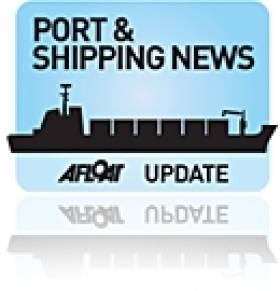Displaying items by tag: Lockout 1913
#Lockout1913 – S.S. Hare the ship that carried vital cargo food supplies from the British TUC to support 25,000 striking workers and their families during the 1913 Lockout was re-enacted yesterday, writes Jehan Ashmore.
Hundreds of people lined Sir John Rogersons Quay in Dublin's 'Docklands' where at berth No. 4 the small short-sea cargoship Ben Maye (1979/548grt) berthed alongside the last remaining campshire ware-houses.
To mark the unique commemorative voyage from Liverpool to the Liffey, the chartered cargoship coaster Ben Maye as previously reported is operated by the Ramsey Steamship Company. Coincidentally the Isle of Man based shipping company was founded a century in the same year of the so called Lockout.
Ben Maye was 'dressed overall' and her bows drapped with banners displaying her temporary renaming in the role of S.S. Hare. After the eventful year of 1913, she was sunk during WW1 by a U-Boat off the Kish Bank in 1917.
As the Ben Maye entered firstly through the East-Link toll lift bridge she was given an escort led by East coast rowing skiff's, Dublin Port Company tug sisters Shackleton and Burford and Dublin Bay Cruises excursion vessel St. Bridget. Following that she made the short distance upriver after passing the opened Samuel Becket swing-bridge.
Senior trade union official made speeches at the quayside and the organisers gratefully acknowledge the support received for the SS Hare re-enactment from the Irish Congress of Trade Unions, SIPTU, Unite, Dublin Council of Trade Union, Dublin Port Company. Also providing assistance was the RMT, the UK's largest specialist transport union and the International Transport Workers' Federation (ITF).





























































